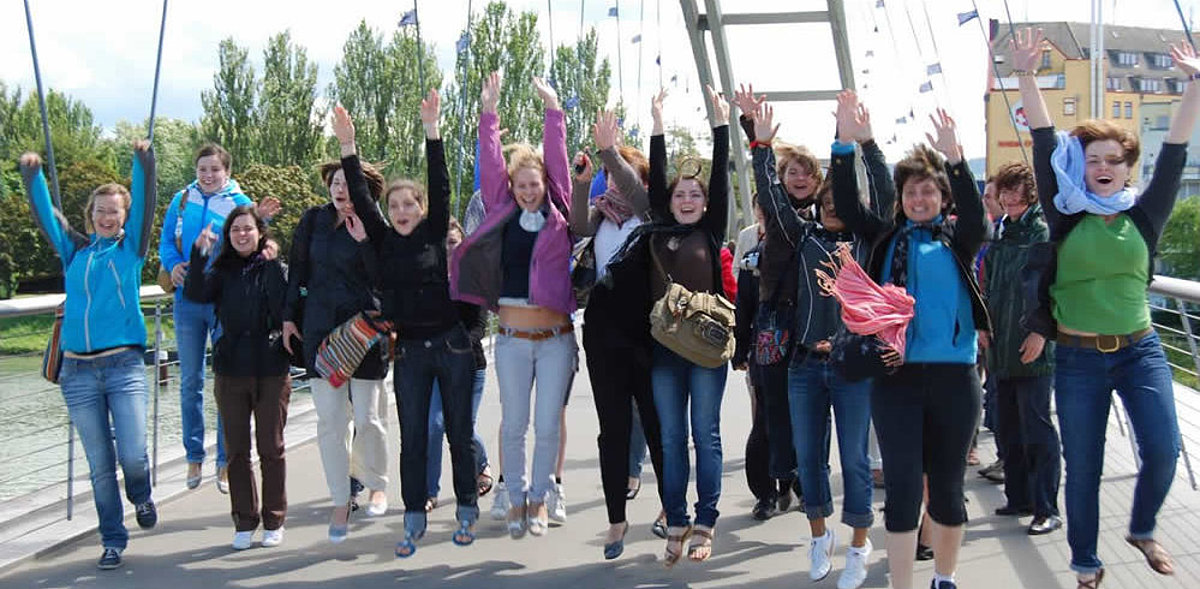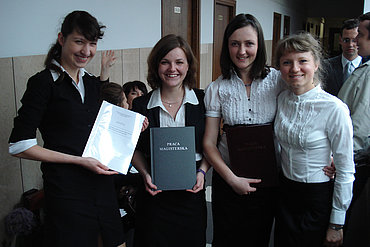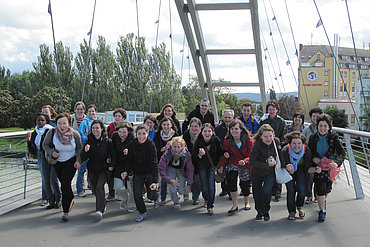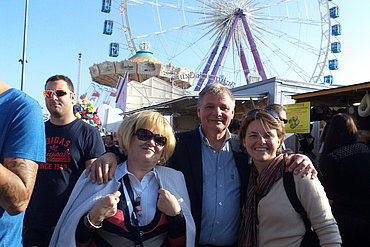I would like to be happy
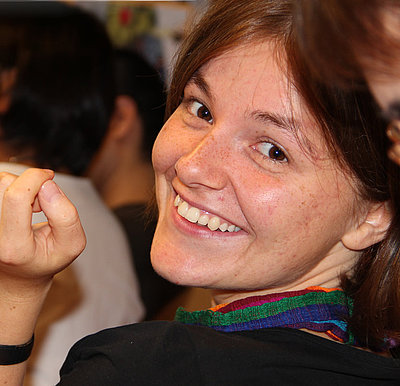
What do the words “genuine freedom” and “true love” mean? What meaning does my life have? Where and how will I find the truth among so many divergent facts and feelings? These questions, which burn in the hearts of many young people, have consciously, and sometimes unconsciously, challenged me in my search for happiness. My name is Róża, and I come from Lublin, a small town in Poland where my parents and my brother and his family are currently living. In my parents’ home I received everything a child needs to grow and flourish – the love of my parents for each other and their children, faith in God, as well as freedom and trust. As a teenager, I was active in several groups for young people organized by Franciscan nuns of my parish. At the Catholic University of Lublin, where Karol Wojtyla had taught ethics, I studied German language and culture with the desire to become a translator. While many of my friends had clear ideas of what they wanted to study even before graduation from secondary school, the choice of study was not easy for me. I was interested in many things, but above all I simply wanted to be happy. Sometimes I felt uncomfortable about my future, and in one of these moments I went into a church and silently prayed before the Eucharist. With tears in my eyes, I told God my situation. Suddenly I heard inside me these words, "You will study my love". I left the church and went home full of joy, realizing that whatever future choices I made would be meaningful and set me on a path so that I could better know Jesus. |
The five college years were very intense, full of study, but also of many friendships. My friends and I met together not only to study and party, but also to pray with the concrete purpose of finding a husband or wife. I must admit that this particular prayer was fruitful; many of my friends, finding someone they wanted to love for the rest of their lives, got married. I often joked saying, "I don’t pray for a good husband, but I ask the Lord to give me what is best for me.”
I became more relaxed as I studied, thinking that for five years I would not have to worry about the future. My motto during this time was: “Love and live your life”. The time was filled with various activities, including a dance course. I asked several friends to be my partner, but no one had time. Finally I asked a boy who played in a rock group. He became my dance partner, and we ended up staying together for three years.
The last year of college was very different from the previous ones. There were not as many contacts with friends, as some had married and others had gone in various directions. My boyfriend and I began talking about marriage and a future together, but I had doubts and didn’t know if we should marry. It was a tough period, and I felt alone as I faced a storm of questions, desires, and contradictions that seemed irreconcilable.
During this same period there was growing in me a need for silence, from which, however, I tried to escape through music, movies, shopping, or Facebook. Then suddenly, all at once, my efforts to escape seemed to explode inside me as a cry for help. Tearfully I began to pray, and when my emotions settled, I no longer felt alone. SOMEONE was present and on my side.
At this point I began to read the Bible each day, and in a small notebook I wrote the words that touched me. In this desert I also rediscovered the Eucharist, an experience that gave me the certainty that God is my Father. I knew that he was guiding my life and had a plan for me. Although I did not understand what the plan was, the important thing was to trust him completely. Without the Eucharist, my day felt empty. During this time, and not without pain, my boyfriend and I talked with one another and understood that we would not marry. It was then that we parted and followed our own paths.
My new relationship with God gave me the experience of his concrete closeness, and so my faith, that had previously been quite traditional, became increasingly personal. In my search for love and happiness, the question "What do I want to do?" changed to "What do you want me to do, God? What is your wish for my life?”
One day I told a nun that I had left my boyfriend, and I shared with her the questions that I was asking.
I thought maybe she would console me. But in a very firm voice she told me, "You are a weak woman. Jesus helped you. Now you should take up your studies. Write your thesis, take your exams, and afterward you can begin to ask yourself about the future. Otherwise you won't accomplish anything.”
I only had a month to finish my thesis, and I realized that I would have to radically change my daily activities and stay on task if I was going to succeed. Each morning I got up early, read the Word of God, took time for prayer, went to Mass, worked, and wrote. There were moments of discouragement, but at the same time I felt carried by SOMEONE bigger than I who knows everything. I also discovered in the saints -- including Pope John Paul 11 and Edith Stein -- new travelling companions, and I was moved by the text from Ephesians 3:20, which says, “Now to him who, by the power within us, is able to accomplish far more than we can ask or imagine....” In this difficult time, I was given new confidence and knew that God was working in my life even though I could not see it.
The Scalabrinian Secular Missionaries came to the University of Lublin at this time for talks and meetings with students. I had heard about their Centres and the International Meetings, and I was intrigued. I applied to participate in a summer camp with other young people from different countries, was accepted, and went to Switzerland. The week at Solothurn was one of deep and profound rest, although the days spent together were very intense. I met with refugees and prisoners, as well as other students and members of the Scalabrinian community. And I finally felt free – free from the worry and anxiety that had surrounded me, free to accept whatever future God wanted for me.
I made an unexpected discovery about myself while at Solothurn. In suggesting some ideas for reflection, Maria Grazia, one of the founders of the Scalabrinian Secular Missionaries, used the image of an inverted cup – a cup turned upside down which, because of its position, could neither receive nor give; a cup that was thus unable to fulfil the purpose for which it had been made. It seemed to me that my life was like that cup. I wanted to live it my way. But a passage in the Bible took me a step beyond myself and helped me realize that there is a better way: "For God so loved the world that he gave (hingab) his only Son, so that everyone who believes in him might not perish but might have eternal life.” (John 3:16) This German verb – hingeben – worked inside me and would not let me go. God gives his Son – everything that he has – because he loves me and doesn’t want me to be lost. This realization made me want to turn my cup right side up and give my life to him.
A song stayed in my mind after leaving Solothurn. It was called "Long Happiness Train" and referred to the story of Adelia, another founder of the Scalabrinian Missionaries, who gave an unconditional “Yes” to God at a moment when her future seemed to be closed. In prayer, I reflected on this song and on my own life situation. I was at a turning point. Many things had changed, including friendships and study. My plans for the future seemed pale and no longer enough. I wanted to be happy, and God also wanted me to be happy. I had often prayed, “I don’t know where and to whom I will give my ‘Yes.’ I'm ready for anything, a wedding, a consecration, whatever you want, Lord. The most important thing is to be with you.”
It was a little prayer, but full of confidence, and with this confidence and joy I returned home.
Das Leben hingeben – giving one’s life. I wondered what those words meant for me. It became increasingly clear that I could not turn in on myself, continuing to collect new experiences, even if positive and good. Now I had to choose concretely. Although after graduation I received three interesting job offers, I knew that there was more at stake than just a job. I had discovered God’s love and faithfulness, and I needed to speak with someone who could help me understand what God was doing with me. Through dialogue with a priest, I learned that the happiness I was seeking was God himself. I so much wanted love, and it became evident that God, who is Love, also wanted this for me. And so I let myself be found by him.
For three years I’ve been living in community with the Scalabrinian Missionaries. Before joining the community, I had had no contact with migrants and refugees, and at first I did not know how to behave or what to say. But I am gradually learning to see Christ in each of the refugees I encounter. I sometimes feel powerless to help, but I see their faith and unshakable hope in God, and I am learning to listen and to be present with them. Together we will build bridges and open new roads of welcome and trust.
Thanks to the study and formation I’m receiving in the community, I now teach German courses to several groups of migrants. I receive so much more than I can give! The language we learn together becomes a communication bridge that allows us to share joys and hardships so that we can feel more at home here in Germany.
On one of my first trips back to Poland to visit my family, my dad asked me, “When you didn’t know what to do with your future, why didn’t you ask me? It wasn’t only God who had a plan. I also would have had a plan for you – one that would have kept you closer to home." I didn’t know what to say. In saying “Yes” to Jesus, our life changes totally. Our hearts are enlarged by the Holy Spirit so that we can love from his love, and this transformation, which sometimes hurts, fills us with a joy beyond anything we could ever design for ourselves.
Together with Julia, I professed the vows of poverty, chastity and obedience in the Cathedral of Solothurn, the small Swiss town where our community began. I thank God for his faithfulness, for taking me beyond myself and bringing me more and more into the mystery of his great love – the mystery of the Crucified and Risen Lord. I understand that he is fulfilling a promise he made many years ago in a church in Lublin where he told me, "You will study my love." This love exceeds all my expectations and experiences. It is the seed of new life, and I pray that it will bear fruit not only for me, but for everyone.
Thank you for your prayers that accompany us on the roads of Exodus!
Róża Mika
Similar blog articles
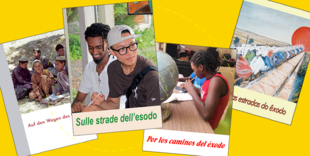
12.12.2023
International Centres, Young people, Migration, Life testimonies
Magazine ORE
"On the roads of the exodus” is a magazine that serves as an instrument of dialogue and encounter among people of different cultures.
Read more
13.09.2020
Solothurn (CH)
Life testimonies
Donner la vie, donner envie
On the webpage of the Centre Romand des Vocations were published some short films for the series called "donner la vie, donner envie". It aims at telling about different paths and ways of living God's personal call. Among them, you will find an interview with Béatrice. English version of the text follows.
Read more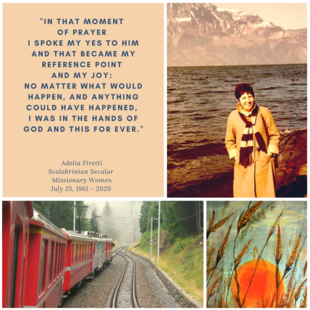
25.07.2020
Life testimonies
59th anniversary of the Scalabrinian Secular Missionary Women
In that moment of prayer I spoke my yes to him, handing him over my life completely.
This secret vow became my reference point and my hope: no matter what would happen, and anything could happen, I was in the hands of God and this for ever. I entrusted myself to Him and this was my strength and my joy.
Adelia Firetti

